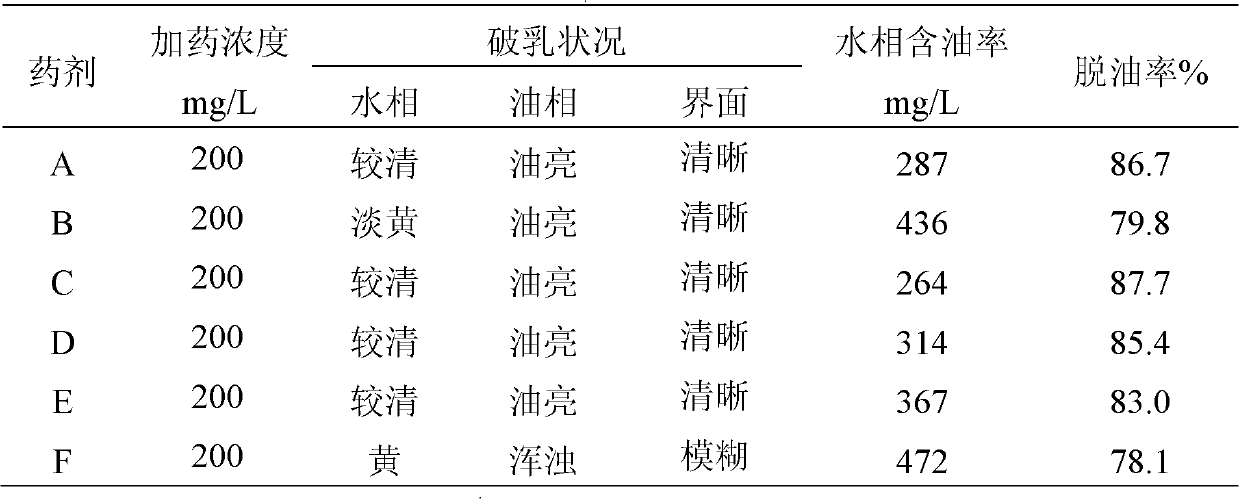Reverse demulsifier and its preparation method
A reverse-phase demulsifier and reaction technology, applied in the field of petroleum industry, can solve the problems of high oil content in the water phase and clogged filter with sludge, and achieve the effect of low equipment requirements, no high temperature and high pressure reaction, and good demulsification effect
- Summary
- Abstract
- Description
- Claims
- Application Information
AI Technical Summary
Problems solved by technology
Method used
Image
Examples
Embodiment 1
[0020] Example 1. Synthesis of inverse demulsifier A
[0021] (1) Synthesis of linear polyamide-amine quaternary ammonium salt
[0022] At room temperature, slowly add methyl acrylate dropwise to ethylenediamine. After reacting at 70°C for 4 hours, the temperature is raised to 90°C~95°C and reacted for 24 hours to obtain linear polyamide-amine; drop epichlorohydrin at 5°C Add it to a polyamide-amine aqueous solution with a concentration of 50% by mass, react at room temperature for 5 hours, then heat to 65°C for 1 hour, and distill under reduced pressure to remove water to obtain linear polyamide-amine quaternary ammonium salt JXY01; The molar ratio of ester to ethylenediamine is 1:1, and the mass ratio of polyamide-amine to epichlorohydrin is 12:10.
[0023] (2) Synthesis of amphiphilic cationic polymer
[0024] Using nonylphenol as the initiator, the alkoxylation reaction with ethylene oxide is carried out under the catalysis of potassium hydroxide at 120~130℃ and 0.2~0.4MPa to obt...
Embodiment 2
[0028] Example 2. Synthesis of inverse demulsifier B
[0029] (1) Synthesis of linear polyamide-amine quaternary ammonium salt
[0030] At room temperature, slowly add methyl acrylate dropwise to ethylenediamine. After reacting at 70°C for 4 hours, the temperature is raised to 90°C~95°C and reacted for 24 hours to obtain linear polyamide-amine; drop epichlorohydrin at 5°C Add it to a polyamide-amine aqueous solution with a concentration of 50% by mass, react at room temperature for 5 hours, then heat to 65°C for 1 hour, and distill under reduced pressure to remove water to obtain linear polyamide-amine quaternary ammonium salt JXY02; The molar ratio of ester to ethylenediamine is 1:1, and the mass ratio of polyamide-amine to epichlorohydrin is 50:3.
[0031] (2) Synthesis of amphiphilic cationic polymer
[0032] Using nonylphenol as the initiator, potassium hydroxide is used to catalyze the alkoxylation reaction with ethylene oxide at 120-130°C and 0.2-0.4MPa to obtain nonylphenol po...
Embodiment 3
[0036] Example 3. Synthesis of inverse demulsifier C
[0037] The linear polyamide-amine quaternary ammonium salt JXY01, the amphiphilic cationic polymer LYJ01, and the cationic surfactant dodecyltrimethylammonium bromide are dissolved in water to obtain inverse demulsifier C; among them, the linear polyamide- The mass ratio of amine quaternary ammonium salt, amphiphilic cationic polymer, cationic surfactant and water is 30:17:3:250.
PUM
 Login to View More
Login to View More Abstract
Description
Claims
Application Information
 Login to View More
Login to View More - R&D
- Intellectual Property
- Life Sciences
- Materials
- Tech Scout
- Unparalleled Data Quality
- Higher Quality Content
- 60% Fewer Hallucinations
Browse by: Latest US Patents, China's latest patents, Technical Efficacy Thesaurus, Application Domain, Technology Topic, Popular Technical Reports.
© 2025 PatSnap. All rights reserved.Legal|Privacy policy|Modern Slavery Act Transparency Statement|Sitemap|About US| Contact US: help@patsnap.com

